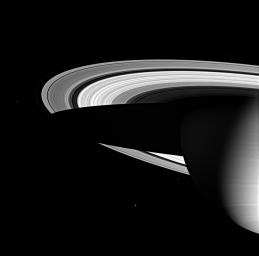
|
Saturn’s Icy Realm
- Click the image above for a larger view
- Full-Res JPEG (977 x 967) (45.5 kB)
- Full-Res TIFF (977 x 967) (946.0 kB)
Caption:
Three of Saturn's icy moons are seen here, along with the magnificent water-ice rings and the cold gaseous envelope of the planet's atmosphere. Saturn's dark shadow stretches completely across the rings.
At nine and a half times farther from the Sun than Earth, Saturn inhabits the deep cold of the outer solar system. The Sun appears only 1 percent as bright there as it appears at Earth, creating an environment where ice dominates over rock.
The icy Moons visible here, from left to right are: Janus (181 kilometers, or 113 miles, across), Enceladus (505 kilometers, or 314 miles, across), and Epimetheus (116 kilometers, or 72 miles, across).
The image was taken in visible green light with the Cassini spacecraft wide-angle camera on June 1, 2005, at a distance of approximately 2.4 million kilometers (1.5 million miles) from Saturn. The image scale is 139 kilometers (86 miles) per pixel.
Background Info:
The Cassini-Huygens mission is a cooperative project of NASA, the European Space Agency and the Italian Space Agency. The Jet Propulsion Laboratory, a division of the California Institute of Technology in Pasadena, manages the mission for NASA's Science Mission Directorate, Washington, D.C. The Cassini orbiter and its two onboard cameras were designed, developed and assembled at JPL. The imaging team is based at the Space Science Institute, Boulder, Colo.
For more information about the Cassini-Huygens mission visit http://saturn.jpl.nasa.gov . For additional images visit the Cassini imaging team homepage http://ciclops.org .
Cataloging Keywords:
| Name | Value | Additional Values |
|---|---|---|
| Target | Saturn | Enceladus, Epimetheus, Janus |
| System | Saturn | |
| Target Type | Planet | Satellite |
| Mission | Cassini-Huygens | |
| Instrument Host | Cassini Orbiter | |
| Host Type | Orbiter | |
| Instrument | Imaging Science Subsystem (ISS) | |
| Detector | Wide Angle Camera | |
| Extra Keywords | Atmosphere, Grayscale, Shadow, Visual, Water | |
| Acquisition Date | ||
| Release Date | 2005-07-08 | |
| Date in Caption | 2005-06-01 | |
| Image Credit | NASA/JPL/Space Science Institute | |
| Source | photojournal.jpl.nasa.gov/catalog/PIA07538 | |
| Identifier | PIA07538 | |
